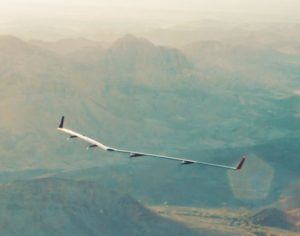Solar powered plane by Facebook to provide internet in India
Facebook is pushing for its solar powered ‘Aquila’ drone to take high speed internet connection to inaccessible and rural parts of India.
Social media giant Facebook is actively engaged in realising its project of provision of internet through flight in India. In talks with the Indian government and the telecommunication companies, the project is set to be implemented through its solar-powered plane called Aquila. Facebook has started to tie up with telcos as part of the Express WiFi project to provide broadband services in remote areas in India, Facebook’s Connectivity Public Policy Director Robert Pepper shared with ET.
“Having fibre-like speeds in places without fibre and making it available to anybody is the reason why there’s so much interest in Aquila. We have begun discussions with telecom operators to see which ones might be interested,” Pepper said.
The primary objective of Aquila, as projected by Facebook, is to provide last-mile infrastructure support in an attempt to introduce internet access in rural and remote areas in India. A statement that was released by Facebook stated, “Eventually, our goal is to have a fleet of Aquilas flying together at 60,000 feet, communicating with each other with lasers and staying aloft for months at a time — something that’s never been done before.”
Aquila was first tested in June over Arizona, in the US. With an aim of lowering cost for providing internet, solar powered Aquila can stay up in the air for up to 90 days at one go. The craft can beam signals within a 96 kilometre diameter to provide internet to those within this periphery. “Aquila could be used to provide internet in areas where the national optical fibre network (NOFN), renamed Bharat Net, hasn’t reached,” said Pepper.
A ground crew of engineers, pilots and technicians are still required to direct, maintain and monitor Aquila, however. Use of lasers for transmitting payload will allow the new technology to transfer data at 10 times the speed of current systems.
Global project
Facebook is already in the process of identifying the formalities for kick-starting the Aquila project in India. However, this project comes as a part of Facebook’s global initiative to provide internet access to areas where it still remains inaccessible. Jay Parikh, Global Head of Engineering and Infrastructure for Facebook had stated in a blog post earlier, “As many as 1.6 billion of those unconnected people live in remote locations with no access to mobile broadband networks, where implementing existing network technologies is so challenging and costly that it will take years to bring everyone affordable access. As part of our commitment to Internet.org, we formed the Facebook Connectivity Lab to build new technologies — aircraft, satellites and wireless communications systems — to help solve this problem more quickly.”
Facebook’s solar-powered #drone brings internet access to the poorest parts of the world. https://t.co/PVLcvV4jLLpic.twitter.com/6cmDkVzMRa
— UPS Longitudes (@UPSLongitudes) November 7, 2016
Reportedly, Aquila can be used by companies with infrastructural difficulties to provide services in rural areas, due to its lack of demand. This can help these telcos create their own infrastructure once sufficient demand is generated for internet connectivity, after which the Aquila planes can be moved elsewhere. Although the programme is at a nascent stage with conventions and practicalities in regards to implementations yet to be formalised, it is an ambitious project that can look at changing the face of internet availability in areas targeted.










